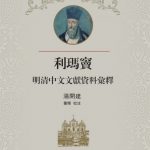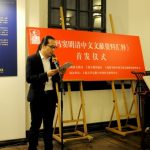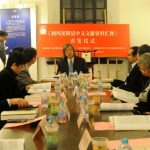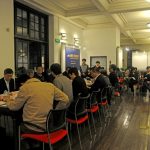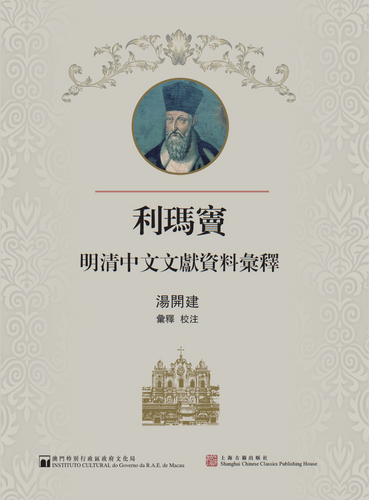 Compilation and Annotations of Ming and Qing Chinese Documents on Matteo Ricci launched in Shanghai
Compilation and Annotations of Ming and Qing Chinese Documents on Matteo Ricci launched in Shanghai
The book Compilation and Annotations of Ming and Qing Chinese Documents on Matteo Ricci, jointly published by the Cultural Affairs Bureau and the Shanghai Chinese Classics Publishing House, was launched at a ceremony held on 7 November together with a scholar exchange session at the Shanghai Library Bibliotheca Zi-Ka-Wei. The launch ceremony was officiated by the Vice President of the Cultural Affairs Bureau of the Macao S.A.R. Government, Chan Peng Fai; the Director of the Shanghai Chinese Classics Publishing House, Gao Keqin; the Deputy Director of Shanghai Library, Zhou Deming; and the book’s author, Tang Kaijian.
The book Compilation and Annotations of Ming and Qing Chinese Documents on Matteo Ricci mainly records the historical material related to Matteo Ricci from the Ming and Qing dynasties documentary archives, specifically from the period between the mid Ming dynasty and the late Qing dynasty. The book consists of six volumes, namely inscription and biography, preface and postscript, official documents, thesis and commentaries, poems and correspondence, and miscellaneous articles, in a total of over 800 thousand characters. The book mainly covers an introduction to the life of Matteo Ricci, specific events he encountered in China, a compilation of his thinking and repercussions and analysis of the Chinese society, fully illustrating Matteo Ricci’s impact on the Chinese society after his arrival in China.
As early as 1615, Nicolas Trigault released his History of Christian Expeditions in China (De Christiana expeditione apud Sinas) based on the Journals of Matteo Ricci. During the four following centuries, several world-class scholars published a number of outstanding works on Matteo Ricci. However, a common problem in the past researches was that Western scholars could not fully understand and make use of materials about Matteo Ricci in Chinese; while Eastern scholars had the same issues with regards to the materials on the missionary in Western languages. The author of this book, Tang Kaijian, has been long dedicated to studies on the history of Macao, of Catholicism in China and of cultural exchanges between China and the West, giving equal importance to original historical data and theoretical interpretation.
This publication, Compilation and Annotations of Ming and Qing Chinese Documents on Matteo Ricci, comprises over four hundred documents collected from different libraries all over the world, databases and private collections, aiming to combine materials about Matteo Ricci which have been published and translated from Italian and other Western languages with records about the missionary in Chinese, in order to understand Matteo Ricci and his time more clearly and precisely as well as to deepen the blossoming “studies on Matteo Ricci”.
The author, Tang Kaijian, is currently a professor at the Department of History of the University of Macau and supervisor of doctoral students. He has long been dedicated to studies on the history of Macao, of Catholicism in China, of cultural exchanges between China and the West and of ethnic groups in China’s borders. He has published 21 academic works and over one hundred articles for several periodical publications, and has been awarded over ten academic distinctions in the provinces of Guangdong and Gansu and in Macao and social sciences awards at national level. Thanks to his remarkable contributions to the study of French history and culture, he was awarded the title of Chevalier de l’Ordre des Palmes Academiques in 2009, becoming the first scholar from Macao and Hong Kong to receive such an honour.
In the ceremony, a number of distinguished guests were invited to participate in the exchange session and carry out an in-depth analysis of the book’s contents. Guests included the Director of the Department of Humanities and History of Shanghai Normal University, Prof. Chen Yuan; the Professor of the Xue-heng Institute for Advanced Studies of the Nanjing University, Song Liming; the Professor of the History Department of the School of Liberal Arts of the Shanghai University, Tao Feiya; the Associate Dean of the School of Humanities of Tongji University, Xu Weixiang; the Director of the Religion Institute of the Shanghai Academy of Social Sciences, Yan Kejia; and the Professor of the Centre for Historical and Geographical Studies of Fudan University, Zhou Zhenhe.
View gallery

